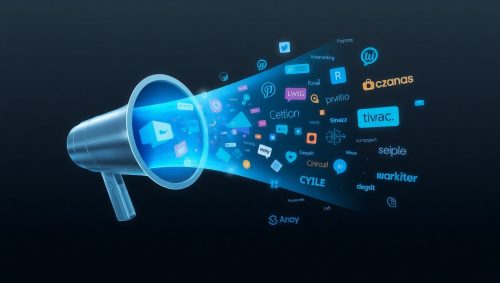In today’s fast-evolving digital landscape, businesses need to stay ahead of the curve to remain competitive. As technology continues to progress at breakneck speed, one of the most powerful tools available is Artificial Intelligence (AI). In particular, AI tools for marketing have revolutionized how businesses understand, engage, and convert their target audiences. By utilizing AI-driven insights and automating key marketing processes, companies can maximize efficiency and improve their customer engagement, driving better results.
AI is no longer a futuristic concept — it’s here, and it’s fundamentally reshaping marketing strategies across industries. In this blog, we will dive into how marketing teams can leverage AI marketing tools to optimize their efforts, enhance personalization, and ultimately achieve better business outcomes.

In a world where customers are bombarded with countless marketing messages every day, cutting through the noise can be a daunting task. Traditional marketing strategies, while effective, often struggle to deliver the kind of personalized experiences that today’s consumers expect. Enter AI. The rise of AI tools for marketing has given businesses a new way to improve decision-making, streamline processes, and deliver highly tailored content at scale.
As organizations increasingly adopt these technologies, it’s clear that AI is a game-changer for marketers. From predictive analytics to customer segmentation, AI tools offer insights that enable brands to be more proactive in their marketing efforts. In this post, we’ll explore the benefits of AI in marketing, how businesses can use AI tools to enhance their marketing strategies, and what considerations must be made before implementation.
Understanding AI in Marketing

Artificial Intelligence refers to the simulation of human intelligence processes by machines, particularly in the context of computers and software. When it comes to marketing, AI tools apply these processes to a wide range of tasks that help optimize a company’s marketing strategies.
At its core, AI in marketing focuses on data collection and analysis. Marketers can now leverage machine learning (ML) algorithms to identify trends, patterns, and behaviors in customer data. This enables businesses to forecast customer preferences and needs, predict future outcomes, and make data-driven decisions that are more accurate and actionable than ever before.
Key Benefits of AI Tools in Marketing
AI tools have become indispensable in modern marketing. Below are some of the key benefits that businesses can gain by incorporating AI into their strategies.
1. Enhanced Personalization at Scale
Personalization is one of the biggest trends in marketing today, and AI enables businesses to create highly personalized experiences at scale. AI marketing tools analyze customer behavior and interactions with brands across various channels, such as social media, emails, and websites. By leveraging this data, AI can help craft customized messages, recommendations, and content tailored specifically to individual users.
For example, platforms like Amazon and Netflix rely on AI to provide product and movie recommendations based on previous purchases or viewing history. This personalized approach not only improves customer engagement but also drives conversions by showcasing products or content that are most relevant to the individual.
2. Improved Customer Insights and Segmentation
Understanding your customers is critical to effective marketing, and AI provides unparalleled insights into customer behavior and preferences. With AI tools, marketers can gather and analyze massive datasets — from social media interactions to website browsing habits — to uncover trends and patterns that would otherwise go unnoticed.
AI can also enhance customer segmentation. Instead of simply dividing customers based on basic demographics, AI enables more sophisticated segmentation based on behavior, interests, and purchasing patterns. This allows businesses to target the right customers with the right message, improving the chances of conversion.
3. Automation of Repetitive Tasks
Marketing teams often spend a significant amount of time on repetitive tasks, such as sending emails, updating social media, or generating reports. AI can automate these tasks, freeing up time for more strategic work. For example, email marketing automation tools like Mailchimp use AI to optimize send times, segment recipients, and even create subject lines that increase open rates.
Similarly, AI-powered social media management tools, such as Hootsuite or Buffer, can schedule posts, analyze performance, and suggest the best times to post — all with minimal input from marketers.
4. Predictive Analytics
Predictive analytics powered by AI enables marketers to anticipate customer needs and behaviors before they happen. By analyzing historical data and identifying patterns, AI tools can forecast trends, predict buying behaviors, and determine the likelihood of a customer making a purchase or abandoning their cart. This information allows businesses to adjust their strategies accordingly, optimizing campaigns and improving customer engagement.
For example, AI can predict the best times to reach out to a customer, suggest when to send promotional offers, or identify which products a customer is most likely to purchase next.
Top AI Tools for Marketing

To implement AI into your marketing strategy effectively, it’s important to know which tools can best serve your needs. Here are some of the top AI marketing tools that businesses are using to enhance their marketing efforts:
1. Jasper AI
Jasper is a leading AI-powered content generation tool that helps marketers create high-quality content in a fraction of the time. Whether you’re writing blogs, emails, or social media posts, Jasper uses AI to suggest and generate copy that is coherent, engaging, and optimized for SEO.
2. Surfer SEO
For businesses looking to improve their SEO strategy, Surfer SEO is an AI-driven platform that analyzes top-performing content and provides recommendations to optimize your website. By using AI to analyze keyword usage, backlinks, and content structure, Surfer SEO helps improve your content’s chances of ranking higher on search engine results pages (SERPs).
3. HubSpot
HubSpot is an inbound marketing platform that integrates AI to automate various marketing tasks. With HubSpot, businesses can streamline email marketing, lead nurturing, and social media management, all while leveraging AI to optimize these activities. HubSpot’s AI-powered CRM helps marketers track customer interactions and make smarter, more informed decisions.
4. ActiveCampaign
ActiveCampaign is a marketing automation platform that utilizes AI to segment your audience and send highly personalized email marketing campaigns. With features like automated workflows and AI-driven customer behavior analysis, ActiveCampaign helps businesses increase engagement and conversion rates.
5. Canva
For businesses looking to create visually stunning marketing materials, Canva’s AI-powered design tools simplify the design process. With features such as automatic photo enhancement, layout suggestions, and text placement optimization, Canva ensures that marketers can easily create eye-catching visuals for social media, advertisements, and other marketing campaigns.
How to Implement AI in Your Marketing Strategy
Integrating AI into your marketing strategy requires careful planning and execution. Here are some essential steps to follow when incorporating AI tools:
1. Assess Your Marketing Needs
Before implementing AI tools, take a close look at your current marketing strategy. Identify areas where AI could bring the most value, whether it’s through content creation, data analysis, customer segmentation, or campaign management. Understanding your specific needs will help you choose the right tools.
2. Choose the Right AI Tools
There are a multitude of AI tools available for marketers, each with unique features and capabilities. Select the tools that align with your marketing goals and integrate seamlessly with your existing systems. It’s important to ensure that the AI tools you choose can complement your team’s workflows and enhance productivity.
3. Train Your Team
Implementing AI tools is not enough — your marketing team needs to be trained in how to effectively use these technologies. Provide your team with the necessary training and resources to get the most out of the AI tools. This will ensure that your marketing efforts are both efficient and effective.
4. Monitor and Optimize
AI tools require ongoing monitoring and optimization. After implementing your AI-driven marketing strategies, analyze the performance data regularly. Look for areas of improvement, make adjustments as needed, and continually optimize your campaigns to maximize results.
Challenges and Considerations
While AI tools offer incredible benefits, there are several challenges and considerations to keep in mind:
- Data Privacy: As AI tools collect and analyze vast amounts of customer data, it’s crucial to ensure that your business complies with data privacy regulations, such as GDPR or CCPA.
- Integration: Integrating AI tools with existing systems can be complex and may require technical expertise. It’s important to ensure a smooth integration process to avoid disruptions in your marketing efforts.
- Cost: Some AI tools come with a high price tag. Before investing, assess the potential ROI to ensure that the tool is worth the cost.
Conclusion
Leveraging AI tools for marketing is no longer optional it’s a necessity for businesses looking to stay competitive in the digital age. By embracing AI technologies, businesses can enhance personalization, improve customer insights, automate repetitive tasks, and predict future trends. While there are challenges to consider, the benefits of AI-powered marketing tools far outweigh the obstacles.
To stay ahead of the competition, businesses must adopt AI tools that align with their marketing goals and continuously optimize their strategies. With the right approach, AI can transform your marketing efforts and help drive better results.
Ready to take the leap and integrate AI into your marketing strategy? Explore the variety of AI tools available and start enhancing your marketing campaigns today.
Embrace AI, enhance your marketing strategy, and stay ahead in the competitive digital landscape!

